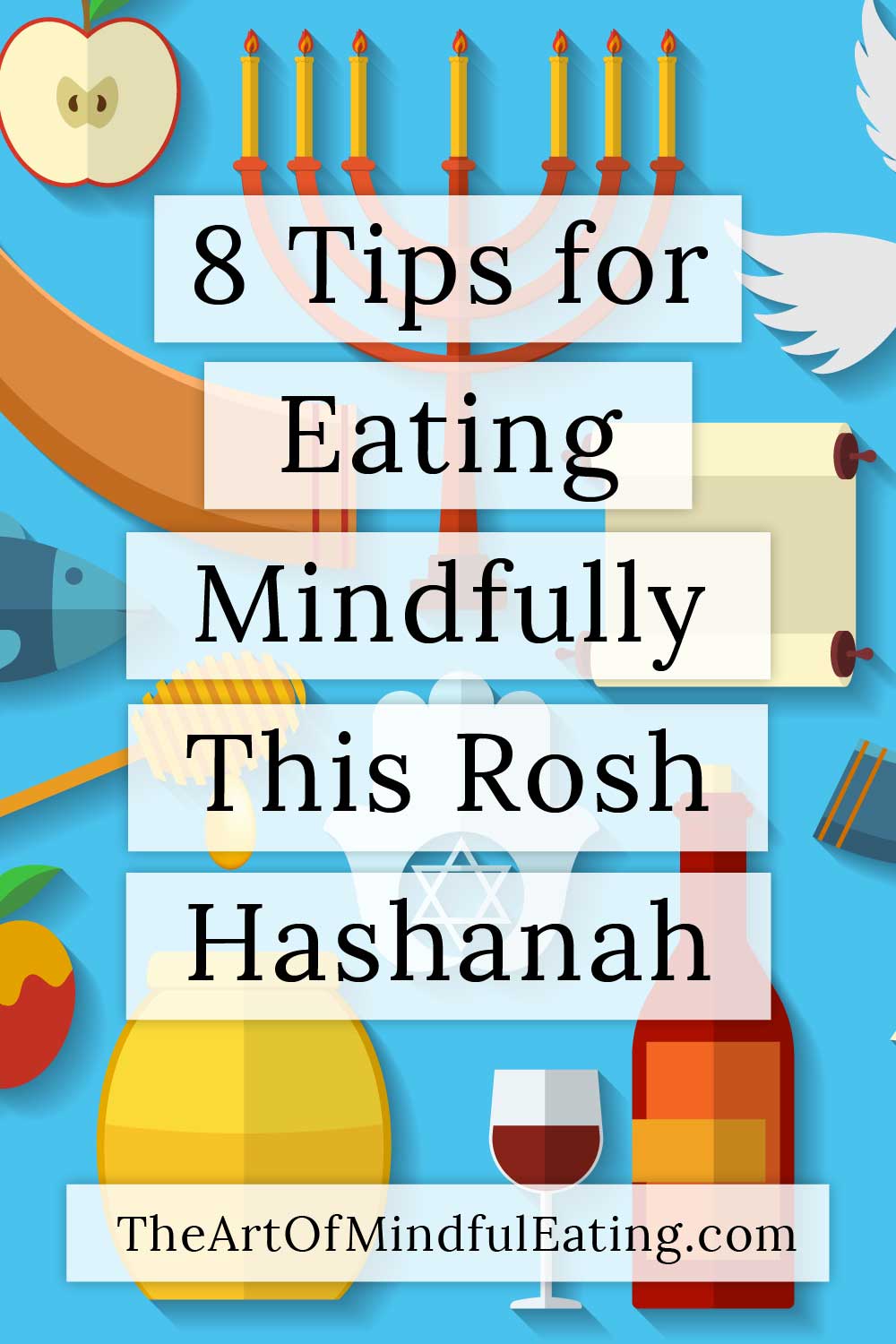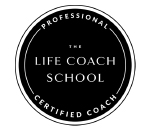8 Tips for Eating Mindfully This Rosh Hashanah

Filed Under: Holiday Eating
20 September 2022 | Written by Xenia Ayiotis

This is certainly going to be a different Rosh Hashanah from all others. It has been such a strange year for all of us. A year filled with challenges, anxiety, fears, insecurity, the unknown, isolated from family and friends yet also some positive aspects for some people, like time at home, less commuting, more time to do things around the house.
Perhaps you are disappointed that this year Rosh Hashanah won’t be the same as other years or maybe you are relieved? You might be concerned about Covid-19 and how you will be able to distance and entertain family and friends? You may be scared of how you are going to handle the variety and abundance of food? Worried that you will overeat all the delicious sugary desserts? Are you looking forward to the connection with family and friends? Or are you dreading it because of family conflict?
Perhaps this year it’s time do things differently and put the worry and drama aside? This is a time of reflection and a time for connection. Think about the meaning of this time and create an intention. Is it to connect with family and friends in a meaningful way? Is it to connect spiritually? Is it to get through this time with grace and ease? Whatever it is, decide ahead of time and try not to create drama around the days ahead. Be very clear about what you are willing to do and what you are not willing to do and as best you can – stick to your intention. When you notice yourself going into drama, gently go back into grace.
Let’s look at some of the most common and a few uncommon triggers around eating over Rosh Hashanah and some suggestions on how you can overcome them.

1. Entertaining friends and family: how to manage Covid, how many people to invite and still stay safe, how to arrange distancing and then the usual like what to cook, preparation, anxiety around entertaining, having enough food, worrying what people will think, wanting to impress your guests.
It is about the food but it’s also NOT about the food. I can almost assure you that no guest will leave hungry! Give yourself enough time to prepare and delegate, delegate, delegate! If people offer help say YES!!
Most people are just so relieved that they are invited and don’t need to do all the hard work, we are way more critical of ourselves than our guests are! Make the preparation as fun as possible! Be there for YOU! Don’t let yourself get ravenously hungry – sit down and eat – don’t mindlessly eat as you cook and don’t neglect yourself as you prepare for the lunches or dinners. Self-care is very important – a quick lie down, meditation, prayer, whatever works for you! There is no such thing as perfection – our peace and freedom lies in the acceptance of imperfection.
Remember no family is perfect. Most families have a level of dysfunction. Let go of the fantasy of “how it should be” and try to allow it to be “as it is”. Not everyone will behave or show up as you would like. Pain, conflict, drama, joy, happiness, it is all part of it. The drama and the joy will pass. When presented with a difficult emotion or situation – know that it will pass. Practice the “Power of the Pause” – pause before eating or reacting. As best you can, focus on the good in the moment, focus on what’s right and bring yourself back to gratitude.
Remember: PEACE, LOVE, GENEROSITY, KINDNESS AND GRATITUDE.

2. The sheer abundance of food and variety of dishes can be triggering to overeat
Firstly, aren’t we blessed to have all this food and choice? Give thanks to the people who prepared the food, the animals who gave up their lives, the farmers, anyone who was involved in the food on the table.
Secondly, if you are on a diet – stop right now! They don’t work – more about this here.
Give up the rules and diet mentality. Let go of thinking of foods as forbidden. This never works and only leads to overeating or binge eating.
Give yourself permission to eat what you want. Please read more about this here – yes I know it’s scary, but it works.
Let me use an example – you go out for dinner and what you really feel like is the pasta but diet mentality tells you “don’t eat carbs at night”; “carbs make us fat”, yadda yadda yadda… so you want to be “good” and you eat the grilled chicken with a side salad, the result is that you are so dissatisfied that you end up binge eating later!
I always tell my clients you can never have enough of what YOU DON’T WANT. So give yourself what you DO want.
Yes there will be specific holiday type foods available only at this time of the year.
Eat them!
Enjoy them!
Savour them!
Do not try to eliminate these foods or say you will resist them because chances are you will land up overeating these foods.
Allow yourself to have these foods. Be selective and discerning. If there are things you can find easily (chocolate, nougat, etc.) rather choose the foods that are more unusual or more difficult to find. You can always go buy the other foods next week, but the homemade honey cake made by Aunty Milly may be harder to come by!
If the dishes you have selected don’t taste good – leave them.
Love what you eat, eat what you love!
Diet mentality says “save the best for last”, I say eat your favourite foods first! If you will fill up on salad, vegetables and chicken and eat your favourite foods last chances are you will feel overfull and uncomfortable. If the only thing you want to eat is chicken soup and kneidlach or honey cake, then eat that and enjoy it.

3. Fear of Missing Out
The reason we fear missing out on food is because we want to taste everything! Choose what you truly want and have it without guilt and with enjoyment. Have small bites and tastes of everything you would like and when you are no longer enjoying it, stop eating it. Apply the practical mindful eating tools in point 5 as best you can.
Reality is that you will probably miss out on something. Perhaps accept that there is a lot that you want (with food and in life) and that you will miss out on some things and that it’s okay. Can you notice your urge to eat out of fear of missing out and be gentle with yourself?
Remember you have a choice. You can eat everything and lots of it and not miss out on anything on the buffet table.
How are you going to feel after that? Chances are you will feel stuffed and uncomfortable. So you are missing out on feeling good in your body. Or you can choose to miss out on some food and feel better in your body afterwards. There is no right or wrong – it’s a choice – how you would like to feel at the end of the meal.

4. Overeating to please the host and dealing with food pushers
There are many ways to show appreciation to your host other than by overeating. Express thanks and gratitude. Acknowledge all the hard work and preparation it must have taken. Compliment the host, ask for the recipe, offer to help. A simple “I couldn’t possibly eat more of this delicious food. I will feel so uncomfortable it will spoil my meal” is also enough.
The basics are:
- Delay the eating
- Distract the food pusher
- Decide if you are going to eat or not
- Determine what and how much

5. All or nothing thinking
Something that may come up in this unusual time is a thought like:
- This year has been so awful that I am just going to eat!
- I’ve blown it so what’s the point?
- That’s enough
- I shouldn’t; I mustn’t
- Everyone else is eating
- I have overeaten, so I may as well carry on
- Who cares!
- What the hell!
- I will start again next week …after Yom Kippur
Every meal is an opportunity to practice, learn and start again. Learn from the previous meal and apply it to the next. We are aiming for progress NOT perfection – imperfect action!

6. Yom Kippur
Many people dread fasting for Yom Kippur every year. Very often we overeat because of fear of the hunger “to come”, as Geneen Roth says. Just the mere thought of restriction can lead to overeating to compensate for the anticipation of hunger and lack.
This year try to approach the fast differently. Don’t resist the fear but perhaps allow yourself to feel the hunger. Remember the reason for the fast and bring meaning to your experience. Use the time of the fast for reflection and try not to focus on the lack of food. When breaking the fast, listen to your body, be gentle with your body by not overfeeding it and slowly introduce food. Be patient with yourself in all ways during the fast.

Our relationship with food is closely linked to how we feel about our bodies. When we don’t like our bodies and we try to change them, it creates dysfunction with food. Can you accept the body you have for this Rosh Hashanah? Perhaps you gained weight during lockdown. No matter the size of your body, your weight, your level of pain, your body’s limitations, it may be difficult to love your body but can you try to accept it as it is now?

8. Judgement
Judgement of yourself, judgement of family, judgement of food … all of these judgements can lead to overeating. Can you replace judgement with acceptance or even better, compassion? Notice when your critical voice gets judgmental and gently replace the thought with something kinder – this isn’t easy but it feels so much better. Treat others as you would like Hashem to treat you this time of the year.
This Rosh Hashanah
May your year be filled with sweetness and joy
May you be healthy and at peace with life as it is right now
May you be blessed with abundance and prosperity
L’Shanah Tovah!
Love
Xen
You might also be interested in blogs about:
“Words can not describe how Xen changed my life! She freed me from being a prisoner of food because food controlled every aspect of my life since I was a child. I abused my body in so many ways from starving myself, eating to the point of feeling sick to my stomach and using exercise to punish myself for the amount of food I had eaten. Xen also taught me to be kind to myself, to be patient with myself and most of all to forgive myself. She helped me to build a healthier relationship with food and my body image. Xen was patient, kind and listened to what I had to say. Her audio lessons and reading material on her online courses and her youtube channel also helped me enormously in this process. She helped me to live the life I was meant to live and I now look at everything in life (not just food) through a different lens!”
“From our first meeting - two faces on Zoom across the world from each other, there was a sense of familiarity and comfort that was a healing balm for a lifetime of food struggles and dieting. Without realizing how much damage I had done to myself by adhering, for decades, to restrictive food plans and rigid diet programs, Xen had a way of redirecting the harsh and negative self-talk and sending me forth each week with compassion, mindfulness and a new way of seeing myself in the here and now. Gone are the maybe somedays, and if-only, and when-I’m-smaller thinking. Now I am committed to the imperfect and rocky path to listening to my body, accepting my perfect imperfections, and rejecting diet mentality. Those negative voices will revisit me from time to time, I know, but Xen has offered valuable tools for meeting each day as a fresh start - another choice, another chance. Her devotion to this work and her belief in her clients is a remarkable gift; I am so fortunate to have found her. It is never too late to let go of the drama and embrace joy, ease and self-acceptance.”
“I felt hopeless and helpless in my daily struggle with mindless eating for many years. Then I found Xen which is exactly what I needed! My decision to work with her helped me to finally repair my relationship with food. It's changing my life for the better, one day at a time. Now I have control over the food, instead of it having control over me, which is the way it should be. I highly recommend Xen to anyone who has a desire to overcome similar food struggles. Xen, thank you from the bottom of my heart!”
“I reached out to Xenia because 2021 started on a tumultuous note for me. Between deaths, businesses suffering, hospitalizations, and job losses in our personal circle, I felt depleted and found myself being available for everyone but myself. Then I was hit with an unexpected health diagnosis, which was the last straw as it meant giving up “healthy foods” and workouts that I leaned on for my well-being and stability. Despite working in wellness (Yes, coaches and healers are vulnerable too!), I found myself reaching out to desserts for comfort. I like to live a life of permissions (not labels or deprivation leading to bingeing), so I wanted to work with someone who approached healing from a place of mindful compassion. I didn’t want to be my own client. Xenia was great in reminding me to be kind to myself. Working with her, brought me peace and helped shift my mindset. I love how desserts and I look at each other now.”
“Working with Xenia was amazing. She armed me with a bunch of tools to help me through difficult times. Xenia is the kind of person who really cares for helping you in the long run. Her work will forever have an impact in my life.”
“Working with Xen was a game changer for me. After working together for a few months my relationship with food radically changed. I no longer felt like a failure. I now have the tools to nourish my body with foods that feel good in my body. I don’t feel guilty about eating cake or chocolate, I also don’t overeat cake and chocolate. I no longer feel the need to exercise to compensate for my eating. I feel much more free around eating and I am more accepting of my body. Xen has a nonjudgmental and compassionate approach to coaching and really supports you in the process.”
“Working with Xen has been very empowering. Her approach is so refreshing from the usual. I have learned that I am in charge and that I get to choose what I put in my body and how to move my body in a way that I like! I get to make my own choices. It’s so liberating. Once you get a taste of freedom with food, there is no turning back to old ways! Thanks Xen for guiding me along the way to freedom.”
“This is the answer for those of you that struggle with food and all that surrounds it. Xenia said that I could make peace with food and it seemed at the time like an impossible dream. Turns out it isn’t. I recommend Xen and the mindful eating / intuitive eating approach unreservedly. If you have any questions about my experience, please get in touch. Thank you Xen. My rating: ⭐⭐⭐⭐⭐”
“Xenia was a walking, living, breathing example of what can be done. I laughed and cried my way through a short course in this fascinating and invigorating programme with her, and have gained a designer tote full of coping skills that go way beyond containing kilogrammes. I feel infinitely lighter. I am doing this for me and, yes, you can do this for you too! And believe me, I’m cynical!”
“I don’t obsess about food like I used to. I am thinking differently about food and feeling so much more relaxed around all types of food. It’s wonderful to have pleasure and satisfaction from eating.”
“I learned a new way of thinking about food. I have learned that food is not the enemy and that it can actually be enjoyed with no guilt.”




